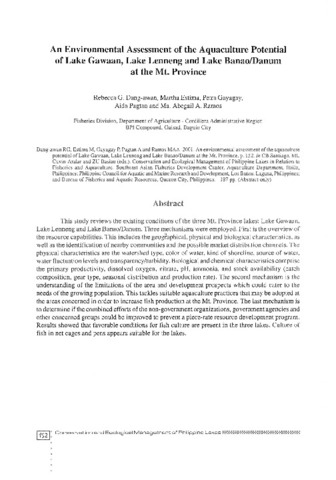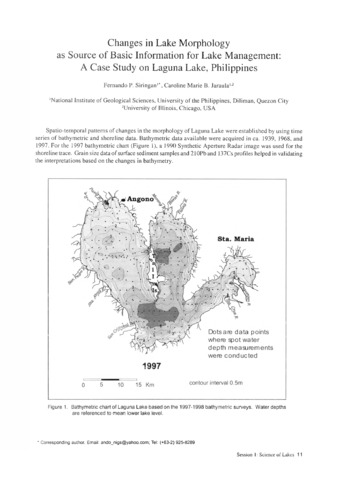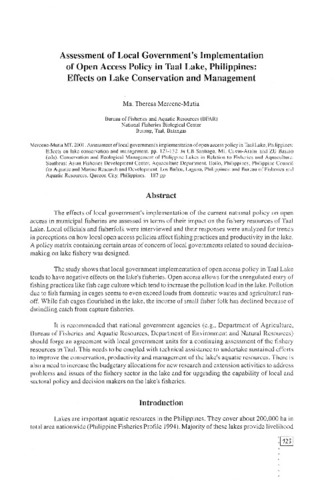Carbon credits for lake basin management
| dc.contributor.author | Santos-Borja, Adelina C. | |
| dc.contributor.editor | Aralar, Maria Lourdes C. | |
| dc.contributor.editor | Borja, Adelina S. | |
| dc.contributor.editor | Palma, Adelaida L. | |
| dc.contributor.editor | Mendoza, Marlynn M. | |
| dc.contributor.editor | Ocampo, Pablo C. | |
| dc.contributor.editor | Manalili, Eduardo V. | |
| dc.contributor.editor | Darvin, Loureeda C. | |
| dc.date.accessioned | 2020-06-18T03:36:09Z | |
| dc.date.available | 2020-06-18T03:36:09Z | |
| dc.date.issued | 2013 | |
| dc.identifier.citation | Santos-Borja, A. C. (2013). Carbon credits for lake basin management. In M. L. C. Aralar, A. S. Borja, A. L. Palma, M. M. Mendoza, P. C. Ocampo, E. V. Manalili, & L. C. Darvin (Eds.), LakeCon2011: Building on the pillars of Integrated Lake Basin Management (Second National Congress on Philippine Lakes) (pp. 318-319). Los Baños, Laguna, Philippines: PCAARRD-DOST. | en |
| dc.identifier.issn | 1656-8099 | |
| dc.identifier.uri | http://hdl.handle.net/10862/5869 | |
| dc.description.abstract | The Laguna Lake Development Authority (LLDA) pioneered the implementation of Clean Development Mechanism (CDM) activities through the Laguna de Bay Community Carbon Finance Project or Carbonshed Project. This mechanism is embodied in Article 12 of the Kyoto Protocol wherein developing and developed countries can work together in reducing the emission of greenhouse gases (GHG) in the atmosphere. In the process, Carbon Credits (Fig. 1) are produced which the developed countries can use to offset their GHG emission. Likewise, the reduction of GHG emission in the lake s watershed improves environmental quality in the Laguna de Bay basin. The Carbonshed Project was implemented from 2004 to 2008 through a grant of USD 358,450 from the Japan Climate Change Initiative that the World Bank administers. The Project s main activity was the development of a set of small-scale projects that reduce GHG emissions in the watershed. Sub-projects were identified and selected through the Laguna de Bay Environmental Action Planning (LEAP) process, a participative and multi-stakeholder planning process that include the LGUs, River Councils and communities in a particular municipality or sub-watershed. The LEAP process was developed under another World Bank and Dutch Governmentfunded project, the Laguna de Bay Institutional Strengthening and Community Participation Project or LISCOP that was implemented almost as the same time as the Carbonshed Project. The small-scale CDM sub-projects (Fig. 2) are being implemented by local government units (LGUs) with technical support from the LLDA and funding support under the LISCOP project. The first bundle under the Methane Avoidance Category consists of seven LGU sub-projects on Materials Recovery Facility with Composting. A significant milestone, both for the LLDA and for the participating LGUs was reached on March 16, 2008 with the registration of the Laguna de Bay Community Waste Management Project: Avoidance of Methane Production from Biomass Decay through Composting-1 to the United Nations Framework Convention on Climate Change- Clean Development Mechanism Executive Board (UNFCCC-CDMEB). The estimated Carbon Emission Reduction was 6,058 tons CO2-e. The buyers of Carbon Emission Reduction (CER), which translates into Carbon Credits is the Community Development Carbon Fund (CDCF). An Emission Reduction Purchase Agreement (ERPA) was signed on June 30, 2006 between the LLDA, representing the CDM-project participants and the World Bank, representing the CDCF. A sub-ERPA was then signed between the LLDA and the project participants as a commitment to meet the obligations under the ERPA. The Carbonshed Project has also established a mechanism to ensure that the money from the carbon credits will be used for operational costs of the existing composting facilities or for new environmental and social investments in the localities implementing these projects. | en |
| dc.language.iso | en | en |
| dc.publisher | PCAARRD-DOST | en |
| dc.relation.ispartofseries | Summary of Proceedings No. 1/2013; | |
| dc.title | Carbon credits for lake basin management | en |
| dc.type | Conference paper | en |
| dc.citation.spage | 318 | en |
| dc.citation.epage | 319 | en |
| dc.citation.conferenceTitle | LakeCon2011: Building on the pillars of Integrated Lake Basin Management (Second National Congress on Philippine Lakes) | en |
| dc.subject.asfa | lake basins | en |
| dc.subject.asfa | carbon | en |
| dc.subject.asfa | lakes | en |
| dc.subject.asfa | developing countries | en |
| dc.subject.asfa | developed countries | en |
| dc.subject.asfa | greenhouse effect | en |
| dc.subject.asfa | watersheds | en |
| dc.subject.asfa | environmental protection | en |
| dc.subject.asfa | methane | en |
このアイテムのファイル
| ファイル | サイズ | フォーマット | 閲覧 |
|---|---|---|---|
|
このアイテムに関連するファイルは存在しません。 |
|||
このアイテムは次のコレクションに所属しています
-
LakeCon2011 [30]
2nd National Congress on Philippine Lakes



